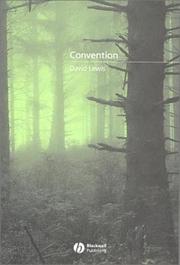| Listing 1 - 10 of 359 | << page >> |
Sort by
|

ISBN: 3351031211 9783351031213 Year: 2000 Publisher: Berlin : Aufbau,
Abstract | Keywords | Export | Availability | Bookmark
 Loading...
Loading...Choose an application
- Reference Manager
- EndNote
- RefWorks (Direct export to RefWorks)
Adel. --- Frau. --- Konvention. --- Geschichte 1886. --- Berlin.
Book
ISBN: 9788757420968 Year: 2009 Publisher: Copenhagen : DJØF Publishing,
Abstract | Keywords | Export | Availability | Bookmark
 Loading...
Loading...Choose an application
- Reference Manager
- EndNote
- RefWorks (Direct export to RefWorks)
Climatic changes --- Global warming --- Klimawandel --- Moot courts --- UNO-Konvention --- Law and legislation. --- UNO-Konvention. --- Klimawandel.

ISBN: 3351031181 9783351031183 Year: 1997 Publisher: Berlin : Aufbau-Verlag,
Abstract | Keywords | Export | Availability | Bookmark
 Loading...
Loading...Choose an application
- Reference Manager
- EndNote
- RefWorks (Direct export to RefWorks)
Konvention. --- Offizier. --- Selbstmord. --- Fontane, Theodor --- Fontane, Theodor, --- Geschichte 1806. --- Berlin.
Book
ISBN: 9780198814771 0198814771 0191852465 0192546376 Year: 2020 Publisher: Oxford Oxford University Press
Abstract | Keywords | Export | Availability | Bookmark
 Loading...
Loading...Choose an application
- Reference Manager
- EndNote
- RefWorks (Direct export to RefWorks)
This volume outlines a model of language that can be characterized as functionalist, usage-based, dynamic, and complex-adaptive. The core idea is that linguistic structure is not stable and uniform, but continually refreshed by the interaction between three components: usage, the communicative activities of speakers; conventionalization, the social processes triggered by these activities and feeding back into them; and entrenchment, the individual cognitive processes that are also linked to these activities in a feedback loop. Hans-Joerg Schmid explains how this multiple feedback system works by extending his Entrenchment-and-Conventionalization Model, showing how the linguistic system is created, sustained, and continually adapted by the ongoing interaction between usage, conventionalization, and entrenchment. Fulfilling the promise of usage-based accounts, the model explains how exactly usage is transformed into collective and individual grammar and how these two grammars in turn feed back into usage.0The book is exceptionally broad in scope, with insights from a wide range of linguistic subdisciplines. It provides a coherent account of the role of multiple factors that influence language structure, variation, and change, including frequency, economy, identity, multilingualism, and language contact.
Grammar --- Pragmatics --- Sociolinguistics --- Konvention. --- Language and languages --- Sprachgebrauch. --- Sprachnorm. --- Sprachsystem. --- Philosophy. --- Philosophy
Book
ISBN: 3830983417 9783830983415 383093341X Year: 2015 Publisher: Münster Waxmann
Abstract | Keywords | Export | Availability | Bookmark
 Loading...
Loading...Choose an application
- Reference Manager
- EndNote
- RefWorks (Direct export to RefWorks)
Von 2013 bis 2015 wurde in fünf Ländern das EU-Projekt "Domestic Violence Met by Educated Women" durchgeführt. Auslöser war die Istanbul-Konvention - das rechtlich bindende Instrument auf europäischer Ebene zur Bekämpfung von Gewalt gegen Frauen. Am Projekt beteiligt waren Frauenorganisationen aus Deutschland, Finnland, Rumänien und Slowenien, eine Organisation aus Schweden sowie das Zentrum für Konstruktive Erziehungswissenschaft an der Universität Kiel. Die Organisationen hatten sich auf zwei zentrale Aufgabenstellungen verständigt. Erstens war zu klären, was in den EU-Ländern unter häuslicher Gewalt gegen Frauen verstanden wurde. Zweitens sollten Vorschläge zur Vermeidung, Verminderung oder Beendigung häuslicher Gewalt formuliert werden. In diesem Buch legt das Kieler Team seine Empfehlungen vor. Die einzelnen Beiträge beschreiben vier Entwicklungen: eine explizite und eindeutige Gewaltdefinition, ein erprobtes Interventionsprogramm, einen objektiven, reliablen und validen Fragebogen sowie ein Angebot zum Storytelling, um Frauen eine Sprache zu geben, die es ihnen ermöglicht, angelehnt an Vorbilder der belletristischen Literatur mit anderen über ihre Gewalterlebnisse und Gewalterfahrungen in Kommunikation zu treten. Das vorliegende Buch des Teams von ZKE ist ein Juwel unter den Werken zum Themenfeld häusliche Gewalt! Es ist keine leicht lesbare Kost, sondern in hohem Maße anspruchsvoll und dem Geiste des Konstruktivismus verwoben [...] Wer sich also nicht auf diese spezielle und herausfordernde Sichtweise des ZKE der Universität Kiel einlassen möchte, wird das Funkeln dieses Juwels nicht erleben! [...] Es eröffnet dem/der LeserIn aber die Chance, mit geweitetem Blick und über die bloße "Mann-Frau"-Kategorisierung hinaus, also quasi von einer Meta-Ebene, das Problem von Gewalt in zwischenmenschlichen Beziehungen neu zu betrachten und zu denken. Das Werk beschert aber auch einen seltenen Einblick in die Problematik von Forschungsprojekten und den Herausforderungen, in einem Verbund mit fünf sehr unterschiedlichen Ländern und Sozialisationen an einem Strang ziehen zu wollen. [...] Wenn etwas die Diskussion um Gewalt im Leben von Menschen weiterbringen wird, so sind es solche herausragenden Werke! - Ute Ingrid Haas auf: socialnet.de
Book
ISBN: 3884001078 9783884001073 Year: 1983 Publisher: [Essen] : Magnus-Verlag,
Abstract | Keywords | Export | Availability | Bookmark
 Loading...
Loading...Choose an application
- Reference Manager
- EndNote
- RefWorks (Direct export to RefWorks)
Bevölkerung. --- Geschichte 1812-1813. --- Preußen. --- Konvention. --- Offizier. --- Selbstmord. --- Geschichte 1806. --- Berlin.
Book
ISBN: 019109191X Year: 2018 Publisher: Oxford : Oxford University Press,
Abstract | Keywords | Export | Availability | Bookmark
 Loading...
Loading...Choose an application
- Reference Manager
- EndNote
- RefWorks (Direct export to RefWorks)
The modification of treaties by subsequent practice extends to all fields of international law, from the law of the sea, environmental law, and investment law, to human rights and humanitarian law. Such modifications can have significant practical consequences, from revising or creating new rights and obligations, to establishing new institutional mechanisms. Determining when and how treaty modification by subsequent practice occurs poses difficulty to legal scholars and dispute settlement bodies alike, and impacts States' expectations as to their treaty obligations. This significant yet underexplored process is the focus of this text. It proves that subsequent practice can - under carefully defined conditions that ensure strict accordance with the will of the treaty parties - alter, supplement, and terminate treaty provisions or even entire treaty frameworks.
Treaties --- Interpretation and construction. --- Vienna Convention on the Law of Treaties --- Wiener Übereinkommen über das Recht der Verträge --- Wiener Vertragsrechtskonvention --- Wiener Konvention über das Recht der Verträge --- Wiener Konvention über das Recht der völkerrechtlichen Verträge --- VCLTK --- WVK --- WRVK --- Völkerrechtlicher Vertrag --- Vereinte Nationen --- 1969 --- Wiener Übereinkommen über das Recht der Verträge --- Wiener Konvention über das Recht der Verträge --- Wiener Konvention über das Recht der völkerrechtlichen Verträge --- Völkerrechtlicher Vertrag

ISBN: 9780631232575 Year: 2002 Publisher: Oxford : Blackwell,
Abstract | Keywords | Export | Availability | Bookmark
 Loading...
Loading...Choose an application
- Reference Manager
- EndNote
- RefWorks (Direct export to RefWorks)
"Convention was recognized as a major contribution to the subject and its significance has remained undiminished since its first publication in 1969. Lewis analyzes social conventions as regularities in the resolution of recurring coordination problems - situations characterized by interdependent decision processes in which common interests are at stake. Conventions are contrasted with other kinds of regularity, and conventions governing systems of communication are given special attention. This book is of central importance to philosophers, linguists, social scientists, legal theorists, and anyone interested in the role of convention in the function of social behavior and language."--Jacket.
Analytizität. --- Communicatie. --- Conventies (sociologie). --- Convention (Philosophy). --- English language --- Konvention. --- Pragmatik. --- Semantik. --- Sociale relaties. --- Sprachphilosophie. --- Taal. --- Theorie. --- Philosophy.
Book
ISBN: 2821875509 3863952049 Year: 2015 Publisher: Universitätsverlag Göttingen
Abstract | Keywords | Export | Availability | Bookmark
 Loading...
Loading...Choose an application
- Reference Manager
- EndNote
- RefWorks (Direct export to RefWorks)
In the age of scarce resources, culture - for example in the form of traditional knowledge or cultural heritage - has become the focus of economic, political and ideal interests. The rights to ownership or use of such cultural assets are negotiated and implemented from international stages to local venues. After six years of intensive, interdisciplinary collaboration, the DFG research group 772 ("The Constitution of Cultural Property: Actors, Discourses, Contexts, Rules") is presenting a multi-part result band on this important, late modern phenomenon of the constitution of cultural property. The first part offers a good idea of various international instruments and arenas, in which the focus is on the protection and valorization of culture. The second part gathers contributions that discuss central motives and ways of legitimizing the valorization of culture and examine concepts that are particularly relevant. In the third part, results from the various sub-projects of the research group are presented.
Cultural property --- Cultural heritage --- Cultural patrimony --- Cultural resources --- Heritage property --- National heritage --- National patrimony --- National treasure --- Patrimony, Cultural --- Treasure, National --- Property --- World Heritage areas --- cultural property --- cultural heritage --- culture --- Indigene Völker --- Konvention --- Kulturgut --- UNESCO --- UNESCO-Welterbe
Book
ISBN: 2821875444 3941875930 Year: 2011 Publisher: Universitätsverlag Göttingen
Abstract | Keywords | Export | Availability | Bookmark
 Loading...
Loading...Choose an application
- Reference Manager
- EndNote
- RefWorks (Direct export to RefWorks)
The main reason why Latin America is a cultural diverse region is because of the indigenous peoples who inhabit it. That is why indigenous peoples' interests on their cultural property have to be taken into account when this matter is to be legally regulated in Latin American countries. In order to ascertain whether that has occurred, the book explores relevant legal instruments at the international and regional levels and compares national norms in some Latin American countries, particularly those concerning ownership. It concludes that recognition of indigenous interests in Latin American law on cultural property is still a pending task. Die Arbeit beschäftigt sich mit der Frage: Wie ist der Schutz von Kulturgütern in Lateinamerika rechtlich geregelt, und in welcher Weise werden indigene Kulturgüter innerhalb solcher Regelungen berücksichtigt? Die Frage besteht aus zwei Teilen. Der erste Teil betrifft eine vergleichende Analyse der geltenden Regelungen über den Schutz materieller Kulturgüter Lateinamerikas. Unterstrichen wird dabei ein Aspekt des Rechtsschutzes von Kulturgütern, nämlich die Regelung des Eigentums. Der zweite Teil der Frage, der sich auf die Berücksichtigung der materiellen Kulturgüter der indigenen Völker bezieht, wird bei der Untersuchung der verschiedenen Rechtsinstrumente beachtet. Dabei geht die Arbeit von der Annahme aus, dass die indigenen Völker ein Interesse an der Kontrolle der mit ihrer Kultur verbundenen Güter haben, welches von den Rechtsnormen in der Regel nicht in Betracht gezogen wird.
Cultural property --- Protection --- Latin America --- Antiquities --- Protection. --- Cultural heritage --- Cultural patrimony --- Cultural resources --- Heritage property --- National heritage --- National patrimony --- National treasure --- Patrimony, Cultural --- Treasure, National --- Property --- World Heritage areas --- Asociación Latinoamericana de Libre Comercio countries --- Neotropical region --- Neotropics --- New World tropics --- Spanish America --- cultural assets --- Archäologie --- Dekret --- Guatemala --- Indigene Völker --- Konvention --- Kulturgut --- San Salvador --- UNESCO
| Listing 1 - 10 of 359 | << page >> |
Sort by
|

 Search
Search Feedback
Feedback About UniCat
About UniCat  Help
Help News
News